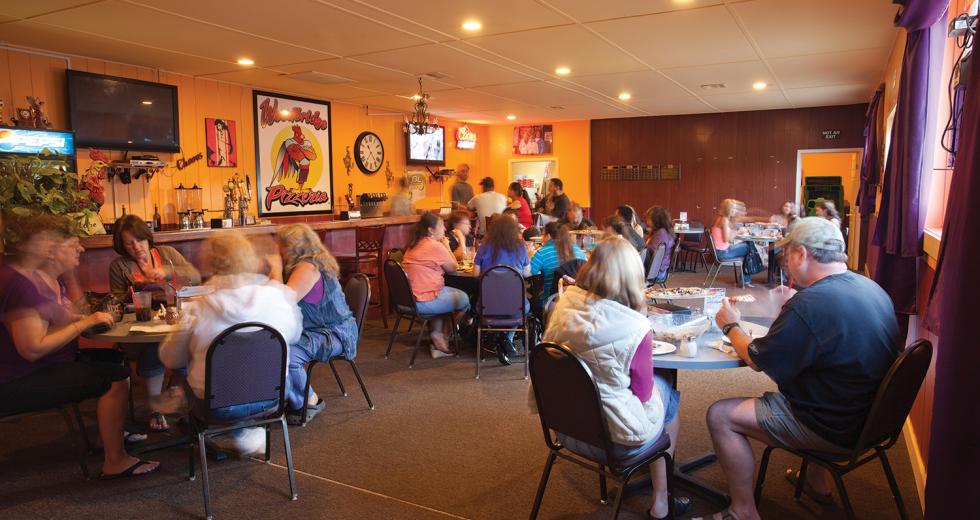With megasites Groupon and LivingSocial trumpeting daily deals that lure throngs of customers with up to 70 percent discounts on everything from dinners to skydiving lessons, it’s no surprise local businesses are signing up. After the deal is on, though, does the promise of new customers and more revenue add up?
Elizabeth Castillo, owner of Woodbridge Pizza of Lodi, says it does. After signing with Groupon, Castillo watched wide-eyed as 371 of her deals sold. Groupon subscribers were tempted with a 50 percent discount — $20 of food for just $10 — at either Castillo’s Lodi pizza place or Woodbridge Pizzeria in Stockton, which she also owns.
Having never heard of Groupon, Castillo thought the company’s boast of delivering new clientele through a massive online advertising campaign with no money down must be a ruse. When Castillo learned Groupon was a major marketing force, she snapped up the offer, even with a whopping 50 percent commission fee.
“The economy was having problems, and this gave us a boost,” Castillo says. “It helped get our name out there and let people know we were here.”
Deal giant Groupon and fast-growing LivingSocial feature a business each day on their websites and send emails or texts to subscribers (Groupon has 375,000 in Sacramento) in the city where the business is located. They write copy, design the deal and then rake in the money by typically charging a 50 percent commission on all coupons sold.
In Castillo’s case, Groupon grabbed $5 of the $10 collected for each deal. When a coupon customer arrived at Woodbridge Pizza, they would get $20 of food, leaving Castillo with her $5 payment from Groupon. Many customers spent more than $20, so Castillo says she made some profit. She received her share from Groupon in three payments over a month.
Profit can be low or nonexistent with a daily deal, but in a choked-up economy, the promised flow of patrons without cash upfront is what attracts many business owners. Cathy Moore, director of Kindermusik in Sacramento, is one of them. When business started to lag, Moore scrambled to reach new customers through the Internet. She contacted both LivingSocial and Groupon about showcasing her children’s music program in the Sacramento area.
Thrilled with her Groupon experience last year (148 sold), Moore went on to offer a similar deal through LivingSocial in April, offering one month of music classes and a CD for $29 — a 60 percent discount. LivingSocial devotees bought 100 of the Kindermusik deals, leaving Moore elated with the results.
“It’s the absolute way for small businesses to market,” Moore says. “For me it has been a fantastic way to reach new clients.”
For some merchants, like Tom Rockenbaugh, co-owner of Urban Dog and Sausage, the hoped-for success didn’t turn out as planned. Rockenbaugh already had a bustling restaurant in Folsom, but last year he signed up with Groupon to promote a new store in Citrus Heights. The deal was $6 for $12 of food, so he predicted the final guest tickets to be $20 to $25. Although Urban Dog sold 900 deals, Rockenbaugh didn’t draw the kind of customers he planned.
“We were trying for bigger tickets by drawing out families,” Rockenbaugh says. “What happened is one person would come in for lunch and make up the rest by taking a couple bottles of soda with them.”
Opening two new restaurants in midtown Sacramento and Rancho Cordova in April spurred Rockenbaugh to give Groupon a second shot, even though the first deal was unprofitable. This time he tweaked the deal to $4 for $8 worth of food, nudging customers to add cash to the coupon. Since lunch costs about $7, the deal required that a single diner buy another item to get the extra $1 or bring a friend and double the bill.
When business owners decide on a daily deal, they should carefully plan the promotion, considering busy and slow seasons, the type of customer they want and their overall business plan, says Julie Gallaher, owner of Get on the Map in Sacramento. Gallaher coaches clients on how to craft a deal and negotiates the terms for them. It’s not the Groupon and LivingSocial reps jobs to determine the best time or ideal item and discount for the promotion, she says.
Groupon spokesperson Kelsey O’Neill, however, says the company’s staff works with each business owner to shape the daily deal to fit their particular business, product and staffing levels to maximize success. Staff members get detailed information about the business and clientele before drafting a deal that is appealing and sensible.
At Laundry Lounge in Davis, Dina Connor created a winning Groupon deal by featuring their signature Drop-A-Load service, which involves little labor and no folding, but hooks their UC Davis clientele with a 98 percent retention rate. Connor estimates she may net only $2 out of the $12 for each Groupon voucher, but telling people about her out-of-the-way laundry business was necessary.
“For us, doing a Groupon for Drop-A-Load was worth it because we knew it wouldn’t just be a one-time thing,” Connor says. “I talked to a girl from UC Davis yesterday who says it was the best thing she’s ever heard of, and she was tweeting about it to tell all her friends.”
Daily deals appeal to consumers because they’re interactive, allowing friends to pass them on, talk about them and get even more of a discount if their friends buy. Because of the growing consumer buzz, Lila Wallrich, creative director at Wallrich Landi Integrated Marketing Communications in Sacramento, has recommended Groupon and LivingSocial deals to clients.
“Groupon and LivingSocial have made the coupon cool again,” Wallrich says. “It’s entertaining because they offer a little back story with imagery. It’s interactive, so it has the social component, and it’s immediate. You print it out and use it.”
Daily deals will likely not be profitable, Wallrich says, but business owners assume building awareness about their product or service is worth the investment. When business owners don’t pay upfront, though, they may incur more of a financial hit later than they had counted on, she says.
Pat Garcia, owner of Skydive Sacramento in Lincoln, cushioned his risk by doing research and negotiating with LivingSocial to get a better than 50/50 split. Although he wouldn’t reveal numbers, he says the high costs of skydiving made it necessary. Even with a higher cut, he’s only making money on extras.
When skydivers jump out of the airplane, Garcia knows photos or video are a must to show friends and family their 120 mph freefall. He counts on the added revenue from those sales as well as drawing more thrill-seekers after customers share the video and pictures with their Facebook friends.
Garcia sold 720 skydiving packages and saw customers from as far as the Bay Area, but he’s leery of doing another daily deal. He fears more discounts could affect his future profit indefinitely.
“Pretty soon customers will say, ‘Hey, when are you running the next Groupon?’” Garcia says. “If everyone did it a few times, nobody would pay the real price and we would be doing jumps for no money.”
Daily deals condition regular customers to expect discounts, and businesses could damage their reputations, being viewed as a discount place, says Dennis Tootelian, marketing professor and director of the Center For Small Business at Sacramento State. While the recession made searching for bargains a necessity, he adds, some people are now addicted, treating the hunt as a game.
For small businesses, Groupon and LivingSocial do provide mass exposure, but these deals could result in price-sensitive customers who will hop to the next business that offers a coupon. Businesses who offer exceptional service have a small chance of retaining customers, Tootelian says, but many fail, not being prepared to serve the onslaught of customers they get.
Action Whitewater Adventures owner Chris Pyle goes above and beyond for people who redeem their LivingSocial deal at his Lotus-based company. During the half-day rafting trip down the American River, clients are treated to lunch, shuttle service and expert rafting guides, with no corners cut.
Pyle’s goal in working with LivingSocial twice, Groupon once and many smaller deal sites was to meet business benchmarks and financial projections. To get business loans, he needed to prove to banks that his business was growing. And after selling a record-breaking 2,636 rafting deals through LivingSocial, he has.
Pyle also sees the downsides of deals — the flood of people who are obsessed with the rush of the sale, plus steep commission rates demanded by LivingSocial and Groupon.
To reach customers in the future, Pyle plans to forego the deal sites altogether and send out his own discounts using the list of names, addresses and emails collected through his release forms from customers who have bought previous deals. Groupon and LivingSocial do collect customer information for their use, but they don’t pass it on to merchants (except for names and voucher numbers). Both companies say they don’t trade or sell subscribers’ information to third parties.
Tootelian predicts business owners will follow Pyle in trying to launch their own deals with information they collect from customers. Release forms are the norm for businesses that offer risk-involved services such as skydiving and rafting, plus any classes will require enrollment information.
This do-it-yourself deal mentality and the recent launch of Facebook Deals and Google Offers could threaten Groupon and LivingSocial, Tootelian says. When big players like Facebook and Google jump into the deal pool, it could get overcrowded and some companies may sink, he says. Now, Facebook is offering deals in five major cities. Google is testing its offers in Portland, Ore., and plans to launch deals in San Francisco and the East Bay soon.
For now, Tammy McDonald of McDonald Training in Newcastle is happy her business is up 50 percent, to which she credits Groupon. McDonald sold 725 group horseback riding lessons and says she’s already had several customers return for more riding lessons, birthday parties and camps.
Groupon statistics tout that 95 percent of businesses are happy with their deals and want to do another. On the flip side, in a nationwide study of Groupon promotions conducted by Rice University, 42 percent of the business owners who participated said they wouldn’t sign up with Groupon a second time. The Rice University study surveyed 150 business owners who were featured in Groupon daily bargains between June 2009 and August 2010.
Local business owners gave mixed reviews. McDonald and Rockenbaugh say the daily deal was good for business, but they’re busy enough. Garcia and Pyle are worried the Groupon and LivingSocial discounts may harm their business or cut their profits. While Connor, Castillo, Moore and Streets of London Pub co-owner Ian Baxter are fired up about reaching a fresh crop of clientele and are ready to hit repeat.
Daily deal subscribers are a hard-to-reach group of young consumers because they don’t watch much TV or read newspapers and they spend hours on the Internet, Tootelian says. Groupon statistics show subscribers are mostly young (68 percent are 18 to 34), educated (80 percent have a bachelor’s degree or higher), females (77 percent) who have money (69 percent make more than $50,00 a year).
“I wish I could pay Groupon less,” Baxter says. “But my wife works for the state, and I know she and her friends are all looking at Groupon deals and sharing them like wildfire.”
Recommended For You

Sticker Shock
Pricing errors can result in traumatic losses. Here’s how to respond.
One morning last year, Cyberguys, a computer and tech accessories retailer, started getting a lot of calls from customers with the same question. Was the company really selling hard drives for $3?

The Strategy of 3
How to conduct an efficient meeting: Improve comprehension, maximize retention.
Three is a magic number. Yes it is. It’s a magic number.
If you’re humming the lyrics to the iconic “Schoolhouse Rock” song, then you are either over 35, a Blind Melon-head or already in tune with the Strategy of 3.



